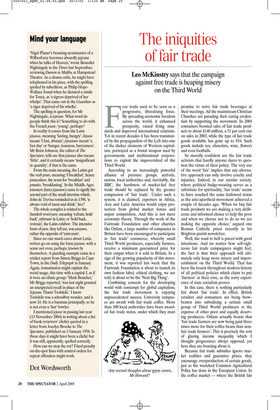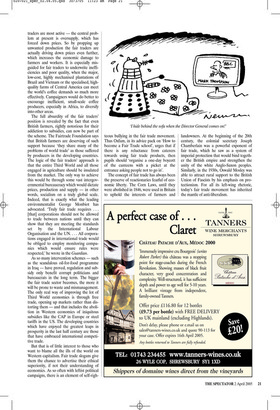The iniquities of fair trade
Leo McKinstry says that the campaign against free trade is heaping misery on the Third World Free trade used to be seen as a progressive, liberalising force. By spreading economic freedom across the world, it enhanced prosperity, raised living standards and improved international relations. Yet in recent decades it has been transmuted by the propagandists of the Left into one of the darker elements of Western capitalism, portrayed as a brutal weapon used by governments and multinational corporations to exploit the impoverished of the Third World.
According to an increasingly powerful alliance of pressure groups, activists, unions, local authorities and, inevitably, the BBC, the harshness of market-led free trade should be replaced by the greater compassion of ‘fair trade’. Under such a system, it is claimed, exporters in Africa, Asia and Latin America would enjoy protection from global market forces and unjust competition. And this is not mere economic theory. Through the work of the Fairtrade Foundation and other charities like Oxfam, a large number of companies in Britain have been encouraged to participate in ‘fair trade’ commerce, whereby small Third World producers, especially farmers, receive a minimum guaranteed price for their output when it is sold in Britain. In a sign of the growing popularity of this movement, it was reported last week that the Fairtrade Foundation is about to launch its own fashion label; ethical clothing, we are told, is about to be the ‘Next Big Thing’.
Combining concern for the developing world with contempt for global capitalism, the fair trade movement is enjoying unprecedented success. University campuses are awash with fair trade coffee. More than 100 local authorities have been awarded fair trade status, under which they must promise to serve fair trade beverages at their meetings. All the mainstream Christian Churches are parading their caring credentials by supporting the movement. In 2004 consumers boosted sales of fair trade products to about £140 million, a 51 per cent rise on sales in 2003, while the type of fair trade goods available has gone up to 834. Such goods include tea, chocolate, wine, flowers and even footballs.
So morally confident are the fair trade activists that hardly anyone dares to question the virtue of their policy. The very use of the word ‘fair’ implies that any alternative approach can only involve cruelty and injustice. Indeed, in our secular society, where political badge-wearing serves as a substitute for spirituality, ‘fair trade’ seems to have reached the same hallowed status as the anti-apartheid movement achieved a couple of decades ago. ‘When we buy fair trade products we are making a very deliberate and informed choice to help the poor and when we choose not to do so we are making the opposite choice,’ argued one Roman Catholic priest recently in his Brighton parish newsletter.
Well, the road to hell is paved with good intentions. And no matter how self-righteous fair trade campaigners might feel, the fact is that their approach will ultimately only heap more misery and impoverishment on the Third World. That has been the lesson throughout modern history of all political policies which claim to put ‘fairness’ at their core, as the sorry experience of state socialism proves.
In this case, there is nothing particularly fair about ‘fair trade’. In effect, British retailers and consumers are being browbeaten into subsidising a certain small group of Third World producers at the expense of other poor and equally deserving producers. Oxfam actually boasts that ‘fair trade farmers are now being paid three times more for their coffee beans than nonfair trade farmers’. This is precisely the sort of glaring income inequality which I thought progressives always opposed, yet here they are boasting about it.
Because fair trade subsidies ignore market realities and guarantee prices, they encourage overproduction of certain goods, just as the wretched Common Agricultural Policy has done in the European Union. In the coffee market — where the British fair traders are most active — the central problem at present is oversupply, which has forced down prices. So by propping up unwanted production the fair traders are actually driving down prices even further, which increases the economic damage to farmers and workers. It is especially misguided for fair traders to underwrite inefficiencies and poor quality, when the major, low-cost, highly mechanised plantations of Brazil and Vietnam or the specialised, highquality farms of Central America can meet the world’s coffee demands so much more effectively. Campaigners would do better to encourage inefficient, small-scale coffee producers, especially in Africa, to diversify into other areas.
The full absurdity of the fair traders’ position is revealed by the fact that even British farmers, rightly notorious for their addiction to subsidies, can now be part of the scheme. The Fairtrade Foundation says that British farmers are deserving of such support because ‘they share many of the problems of world trade’ as those suffered by producers in the developing countries. The logic of the fair traders’ approach is that the entire Third World and all those engaged in agriculture should be insulated from the market. The only way to achieve this would be through some vast intergovernmental bureaucracy which would dictate prices, production and supply — in other words, socialism on a truly global scale. Indeed, that is exactly what the leading environmentalist George Monbiot has advocated. ‘Truly fair trade requires ... [that] corporations should not be allowed to trade between nations until they can show that they are meeting the standards set by the International Labour Organisation and the UN.... All corporations engaged in international trade would be obliged to employ monitoring companies which would ensure rules were respected,’ he wrote in the Guardian.
As so many intervention schemes — such as the scandalous oil-for-food programme in Iraq — have proved, regulation and subsidy only benefit corrupt politicians and bureaucrats in the long term. The bigger the fair trade sector becomes, the more it will be prone to waste and mismanagement. The only real way of improving the lot of Third World economies is through free trade, opening up markets rather than distorting them — and that includes the abolition in Western economies of iniquitous subsidies like the CAP in Europe or steel tariffs in the US. The developing countries which have enjoyed the greatest leaps in prosperity in the last half century are those that have embraced international competitive trade.
But that is of little interest to those who want to blame all the ills of the world on Western capitalism. Fair trade slogans give them the chance to advertise their ethical superiority, if not their understanding of economics. As so often with leftist political campaigns, there is an element of self-righ teous bullying in the fair trade movement. Thus Oxfam, in its advice pack on ‘How to become a Fair Trade school’, urges that if there is any reluctance from caterers towards using fair trade products, then pupils should ‘organise a one-day boycott of the canteens with a picket at the entrance asking people not to go in’.
The concept of fair trade has always been the preserve of reactionaries fearful of economic liberty. The Corn Laws, until they were abolished in 1846, were used in Britain to uphold the interests of farmers and landowners. At the beginning of the 20th century, the colonial secretary Joseph Chamberlain was a powerful exponent of fair trade, which he saw as a system of imperial protection that would bind together the British empire and strengthen the unity of the white Anglo-Saxon peoples. Similarly, in the 1930s, Oswald Mosley was able to attract rural support to the British Union of Fascists by his emphasis on protectionism. For all its left-wing rhetoric, today’s fair trade movement has inherited the mantle of anti-liberalism.






























































 Previous page
Previous page